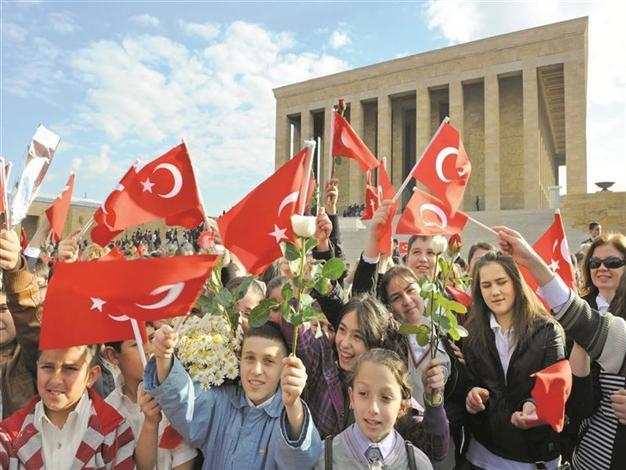Turkish gov’t signals extension for charter deadline
ANKARA - Hürriyet Daily News

DAILY NEWS photo / Selahattin SÖNMEZ
Following statements from Prime Minister Recep Tayyip Erdoğan that indicated a one-month extension for finalizing the ongoing constitution draft process, Parliament’s anniversary, April 23, looms ahead as the new deadline.
“If it is not March, it should be April, but this study should be finalized from now on,” Erdoğan was quoted as saying by ruling Justice and Development Party (AKP) sources at a meeting of his party’s Central Decision and Executive Board (MKYK) on Feb. 13.
April 23 has a symbolic meaning for Turkey’s Parliament. While an uphill struggle in Turkey’s Independence War was under way in 1920, Parliament opened in Ankara and drafted the Constitution. Turkish Parliament approved its first constitution on Jan. 20, 1921, amid tough conditions of war. In 1924, Parliament created the first constitution of the Republican era following the declaration of the Republic of Turkey on Oct. 29, 1923. Both the 1961 Constitution and 1982 Constitution were drafted after military coups.
If Parliament’s Constitution Reconciliation Commission eventually achieves their hoped for result, Turkey will have a constitution made by a civilian authority for the first time since 1924.
Following the prime minister’s remarks, the idea of extending the deadline, most recently set by Erdoğan as the end of March, to April 23 found widespread support at the AKP’s MKYK meeting.
The same idea was first floated around by Nationalist Movement Party (MHP) leader Devlet Bahçeli in late December, when Parliamentary Speaker Cemil Çiçek visited leaders of all four political parties represented at Parliament in a bid to ease the deadlock that was at that time threatening the future of the process.
Bahçeli touched upon the issue once again Feb. 14 during a press conference after his party’s provincial chairpersons meeting and rebuffed Erdoğan’s suggestion for setting a deadline for the charter panel.
“We are totally against Erdoğan’s attempts to water down and harass the constitution making process. Setting a deadline for such a significant work is not an appropriate approach,” Bahçeli said. “We will voice our democratic reaction in every platform and we will do our best for not to disrupt the charter panel.”
The main opposition Republican People’s Party (CHP) as well as the Peace and Democracy Party (BDP) also favors the commission working without a deadline.
Atilla Kart, a Constitution Reconciliation Commission member from the CHP, said that setting a deadline put pressure on the panel. “Imposing a time limitation is a mistake. The commission is working according to its agenda. Nobody should impose his agenda to the commission,” Kart said.
Meanwhile, during the commission’s Feb. 13 meeting, the CHP and BDP suggested that no permission should be sought to investigate public officials for charges of murder, torture and maltreatment. The AKP and MHP opposed the suggestion and the related article was written with parentheses.
In a separate development, Professor Andrew Arato briefed commission members about his studies on the constitution making processes of South Africa, Egypt, Hungary and Turkey. Arato reportedly proposed Turkey implement a South African model, indicating that the country’s constitution was drafted with reconciliation despite racial and ethnic diversity.
